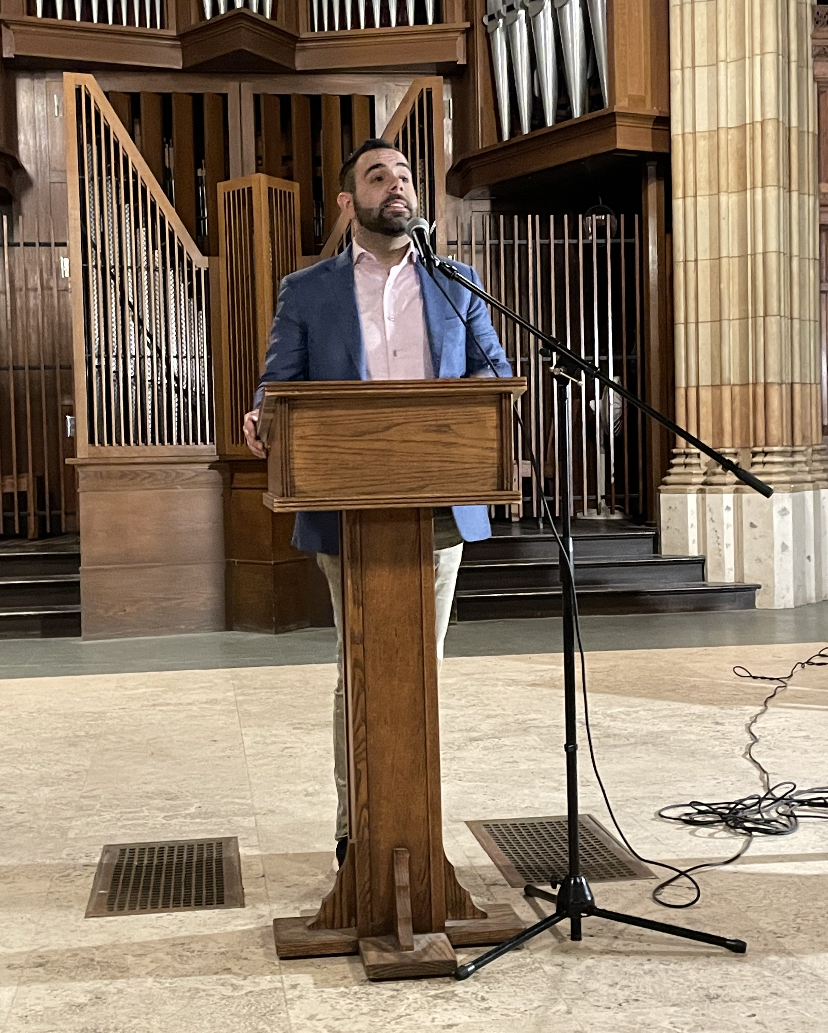Israel and Palestine Human Rights Watch director speaks at Dwight Hall
Students packed into Dwight Hall Chapel on Monday evening to hear Omar Shakir speak about the Human Rights Watch apartheid determination in the Israel and Palestine conflict and to discuss the fight for academic freedom to engage in human rights advocacy on Israel / Palestine

Benjamin Hernandez, Contributing Photographer
Dozens of students and University guests packed into Dwight Hall chapel for a conversation with Israel and Palestine director at Human Rights Watch Omar Shakir.
The Monday evening discussion focused on how Human Rights Watch — an international, non-governmental organization dedicated to investigating and reporting on human rights abuses in all parts of the world — reached its claims of “apartheid” in the Israeli-Palestinian conflict made in a 2021 report titled “A Threshold Crossed” and the fight for academic freedom in engaging in human rights advocacy in relation to this same conflict.
“Those in this audience who strive for Israeli and Palestinian peace — whatever you believe might be the way forward, the first step to getting there is to recognize the reality for what it is,” Shakir said. “Let’s call this spade a spade and let’s bring to bear the sorts of human rights tools needed to get us to a better future.”
The conversation was co-hosted by Yalies 4 Palestine, Yale Amnesty International, the Middle Eastern and North African Association, the Arab Students Association and the Muslim Students Association.
At Human Rights Watch, Shakir investigates human rights abuses in Israel, the West Bank and Gaza. He has also written several major reports, including “A Threshold Crossed,” which asserted that Israeli authorities had committed “crimes against humanity of apartheid and persecution” against millions of Palestinians. As a result of his advocacy, the Israeli government deported Shakir in November 2019.
Shakir first spoke about the Human Rights Watch’s reasoning for labeling the lived reality of Palestininans as “apartheid” by attempting to condense the roughly 200-page 2021 report.
He told the audience that although the term “apartheid” was coined in relation to specific historical events, international treaties define it as a universal legal term meant to describe situations in which there exists severe discriminatory oppression — as is the case for Palestinians.
“A single system methodically engineered to ensure one people flourish and one people do not is not simply a matter of a conflict between two people, ” Shakir said. “The first step to solving any problem is to diagnose it correctly — whether that’s a doctor treating you at the office or it’s us trying to understand how to deal with a protracted situation and conflict [because] the wrong diagnosis leads to the wrong remedy.”
He went on to define the three basic components that make up this international crime, which he claims are all satisfied by the Israel and Palestine conflict: Inhumane acts, systematic oppression, and the intent by one group to dominate another group of people.
Shakir then listed various other individuals and organizations — including Amnesty International and Harvard Law School’s International Human Rights Clinic — who have used the term to explain that this label “isn’t simply the conclusion of Human Rights Watch.”
“The threshold has been crossed: Palestininans have for years and for decades been describing their lived reality as apartheid but not enough of us listen,” Shakir said. “Apartheid is the daily reality for millions of Palestinians.”
Shakir then transitioned into a discussion addressing the issue of the academic freedom and space to speak about Palestine on American campuses, with specific reference to Harvard Kennedy School’s fellowship offer, retraction and reoffer to leading human rights advocate Kenneth Roth.
Kenneth Roth was the executive director of Human Rights Watch from 1993 to 2022. After stepping down from this role, the Harvard Kennedy School’s Carr Center for Human Rights Policy offered him a one-year fellowship, a decision that was vetoed by the school’s dean, Douglas Elmendorf, who was reported to have told colleagues that he believed Human Rights Watch had an anti-Israel bias. The dean recently sent an email to the Harvard Kennedy School explaining that his decision was an “error” and that the school would be offering Elmendorf the fellowship.
“What happened to Ken has been happening to academics who are critical of Israel and speak out for Palestinian rights, and young academics and Palestinians are facing the worst,” Shakir said. “Things are changing [and] the conversation is changing and the arc of history is bending, [but] this is happening at the very same time that the situation on the ground is getting worse and worse everyday, so we live in this dichotomy”
Leyla Hedroug ‘25, the president and founder of Yale Amnesty International and member of all other organizations who co-hosted the event, said that she decided to plan and execute this event as a form of collaboration between all the groups.
“I personally think that when you’re doing a lot of human rights activism, it’s kind of easy to get distraught and feel unmotivated when you don’t see your results immediately, ” Hedroug said. “So this was refreshing to hear and it was words of encouragement to inspire me to continue to keep going with the work that I love to do.”
Miguel Garcia ‘24, who attended the event and is a member of Yalies 4 Palestine, said that he believes it is a part of the mission and capacity of student organizations like Yalies for Palestine to ensure more people are knowledgeable about Palestinian issues.
“In terms of speakers that we’ve had here at Yale, [Shakir] just tackles an issue that pushes on the boundaries of what is acceptable discourse at [Yale],” Garcia said. “The normalization of that kind of debate here at Yale is something that everyone should be in favor of.”
Human Rights Watch is an international, non-governmental organization dedicated to investigating and reporting on human rights abuses in all parts of the world.







